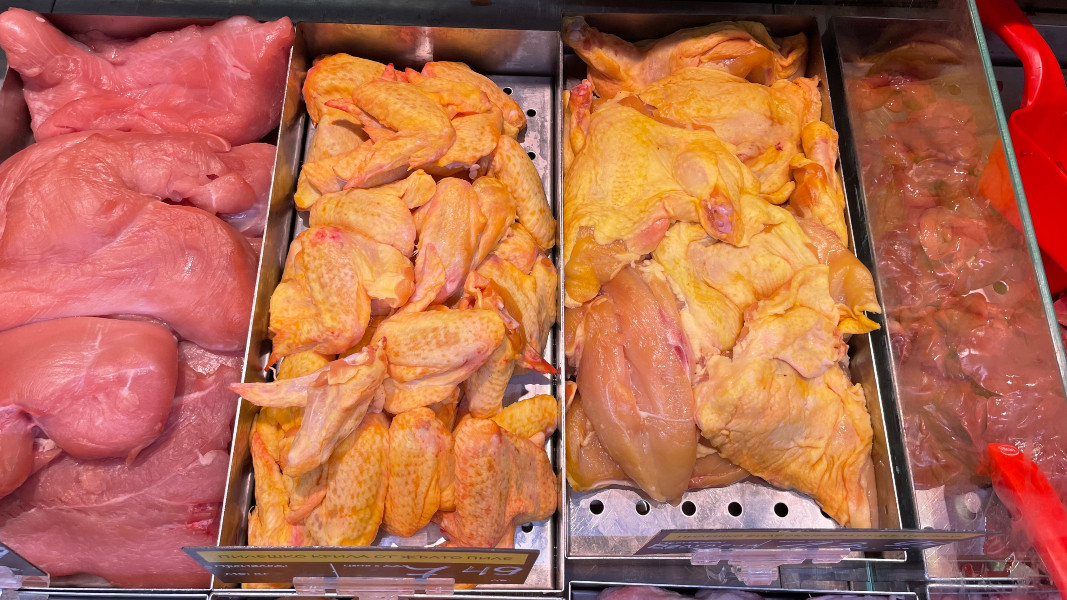The current situation in the sphere of poultry farming in Bulgaria is extremely alarming. Slowly but surely, the Bulgarian producers have been losing their positions on the local market by about 5% per year, while the demands of the poultry farmers have been ignored by several Bulgarian governments.
"Meat from Poland and Hungary displaces the meat produced in Bulgaria. The imported meat is always delivered to Bulgaria on Friday evening and I wouldn't say that it is of the best quality,” Ivaylo Galabov, chairman of the Union of Poultry Breeders in Bulgaria says and adds: “We have enough reasons to ask the Bulgarian Food Safety Agency to ensure constant control for salmonella, because on Friday afternoon, before the slaughterhouses are thoroughly washed and when the risk of salmonella is high, Poland and Hungary try to send their production to countries where control is lower, including Bulgaria."
The Union of Poultry Breeders has three demands: fiscal control, quality control ensuring absence of salmonella and correct labeling of the final products. "The mechanism is the same and applies to all types of meat on the market," Galabov points out.

"Labeling is a major problem. In the stores we do not see products with correct labels showing whether the respective product was obtained from fresh meat and what its origin is. If the label read that a certain product was made from defrosted meat from Poland, I'm not sure it would be bought with the same eagerness. We are some of the poorest consumers in Europe and people are tempted by the low prices. But if everything was written clearly on the product, every user would be able to make an informed decision whether to buy a product or not. We simply want the same rules to apply for everyone on the market and we have been calling on several governments for this," Mr. Galabov says.

What is defrosted meat?
"Defrosting is a normal practice to thaw frozen meat and cook it,” Ivaylo Galabov says. “But in the cases I am talking about we see that frozen meat, which is 20 percent cheaper than fresh meat is bought. This meat is then thawed, cut, flavored, refrozen and sold. There is no demand for frozen meat in Europe, so it is shipped to destinations where people are willing to do something with it. Bulgaria is one of these places."
In European legislation, this way of processing meat is not prohibited, but it is applied to heat-treated products that are blanched and then frozen in order to guarantee their long shelf life. These are all kinds of chicken nuggets, croquettes, etc.

Ivaylo Galabov told us more about some of the practices on the Bulgarian market:
"The process consists of defrosting the meat and adding water, phosphates, etc., to make the product profitable. Defrosting and flavoring brings increased value to the operators and a bad taste in consumers’ mouths. It is even worse for the poultry farmers in Bulgaria, who want to make a living with honest business."
It is necessary to look for mechanisms to stimulate domestic production, but the new Strategic Plan, which is about to replace the current Rural Development Programs, envisages reduction of aid from 50 to 30%, while the current inflation levels put poultry farming and animal breeding at risk, people working in the industry say.
Photos: BGNES, Pixabay
English: Al. Markov
On June 21 and 22, the Expo Center "Flora" in the Sea Garden in Burgas will turn into a culinary arena , where the best paella masters from all over Bulgaria will face each other in the national qualifications for the World Paella Day Cup . There are..
A retaining wall alongside the Banshtitsa River in Kyustendil is being transformed into the country’s longest legal graffiti art wall, according to a report by the Bulgarian News Agency (BTA). "The goal is to attract artists from around the world to..
Back home again after 30 years! This is exactly what is happening to the oldest Bulgarian folk ensemble in North America. Affiliated with the Bulgarian-Macedonian National, Educational, and Cultural Center (BMNECC) in Pittsburgh, Pennsylvania, the Otets..
Summer, high temperatures, holiday mood. But unfortunately, summer brings not only positive emotions, but real and very serious problems. For example,..
At the end of the past week, 53 children from 21 Bulgarian Sunday schools participated in the ninth edition of the international..
Yana Todorova is a tour guide and teacher. Since 2019, she has been a member of the Association of Tour Guides in Bulgaria, but has been working as..

+359 2 9336 661
